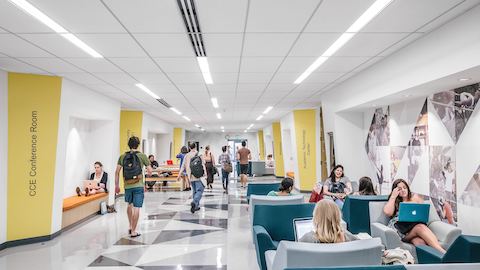California State University, Long Beach
Students transform a corridor into a space where learning happens naturally
Long Beach, California, US
Download PDF (1.2 MB)
The next time you have a seemingly impossible design problem to solve, ask a group of 20-year-olds for help. That’s what David Salazar, Associate Vice President of Physical Planning and Facilities Management at California State University, Long Beach, did when he was faced with the challenge of revitalizing an underutilized corridor in the school’s Academic Services Building.
“One of our main objectives was to develop an inaugural project that used the campus as a living laboratory for students to learn about design, facilities management, and construction,” said Salazar. “And we needed to connect that with the academic side in terms of classes that were being offered in the interior design program.”
Salazar approached Dorothy Ottolia, a professor in the Interior Design Program and Department Chair at the time, and asked her to help turn a space people avoided into a place that would draw people in with opportunities for learning and collaboration. She presented the problem to her students and gave them two weeks to develop proposals.
“This was the students’ first class in the Interior Design program, so I thought it would be a good way to warm them up,” said Ottolia.
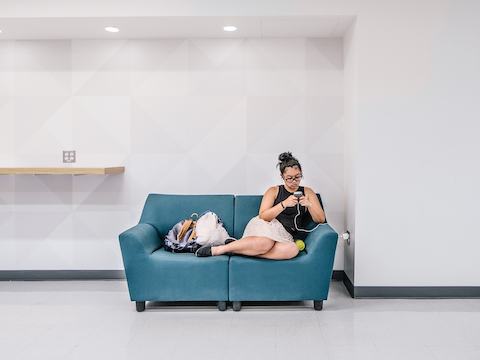
A pair of Swoop Arm Chairs offers a comfortable spot to relax, plug in, and check email.
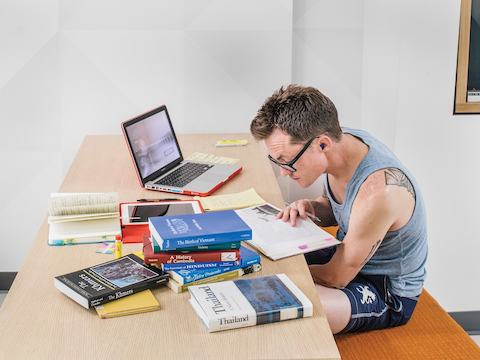
Rows of tables with upholstered benches are a favorite place for students to spread out and study.
The students embraced the challenge, and after two weeks, Salazar and several campus architects reviewed the projects to make sure they were on track. Then, after another two weeks of refinements, a jury including the president of the university, private-sector architects, and members of the campus facilities team critiqued the students’ work and chose a design to be implemented in the corridor space.
“The winning project was selected because it transformed the space, but it did so within the budget,” said Ottolia. “There was very little funding for much beyond redoing the floors, painting, and other minimal changes. Thankfully, Herman Miller came along and partnered with us.”
By working with Herman Miller through the Learning Spaces Research Program (LSRP)—which helps education institutions redesign spaces to enhance collaboration—the university was able to add seating to the new space that would support a range of activities and postures.
The resulting design is a corridor full of light, energy, and, most importantly, people. Said Ottolia of the transformation, “The old space was dark and dingy and was always empty. The new space is bright and alive. It’s constantly packed, and the students love to go there.”
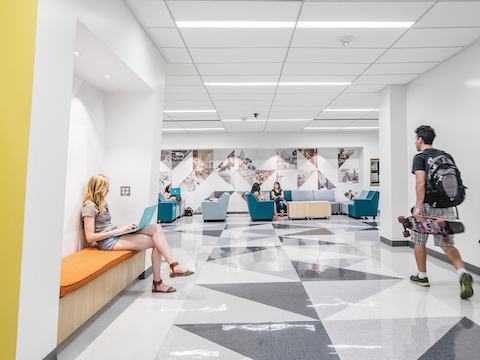
A student-designed floor tile pattern is mirrored in a wall mural with scenes from around the campus.
The revitalized corridor is also highly functional. Thoughtfully arranged groupings of furniture offer students places to meet, study, and even nap between classes.
Enhanced access to power and data makes it easier to charge phones or work on laptops. Wayfinding has been greatly improved, with bright yellow signage clearly designating offices along the hallway.
Ottolia and her students have received letters thanking them for the new space, which students, faculty, and administrators say is helping them learn and work better.
From Salazar’s perspective, the successful redesign is serving as a model for future campus projects. “We want to continue looking at different interior spaces and gauge how to better engage faculty and students, while also maintaining a partnership with furniture manufacturers,” said Salazar.
He continues, “Learning takes place everywhere on campus: in the classroom, outside, in faculty offices. That’s the realization people are embracing now. These in-between spaces are just as important as others.”
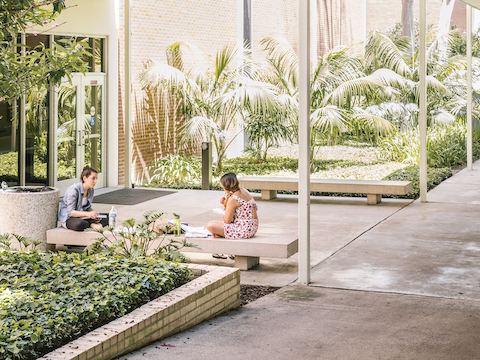
The sunny campus of California State University, Long Beach offers plenty of places, both inside and outdoors, where students can get together.
